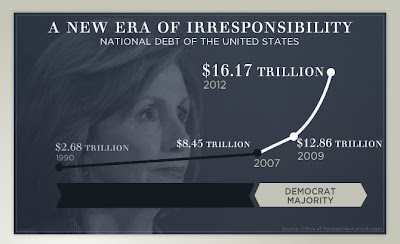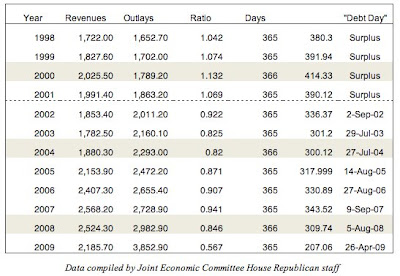Thursday, April 30, 2009
Office Hours Announced for Huntingdon County This Friday
House GOP Leader Boehner: SOS - Save our Savings

John Boehner
April 30, 2009
You don't have to look far to find someone impacted by this recession - whether it's the loss of a job, a reduction in workplace benefits or the evaporation of their retirement, college and personal savings. It could be your neighbor. It could be a family member. It could be you.
All across our country, millions of families and small businesses are struggling to make ends meet during this downturn, and they're looking to our leaders for real solutions to help turn around this situation. They don't care if they're Democratic solutions or Republican solutions. They just want the men and women representing them in office to focus like a laser on getting our economy back on track, helping create more jobs and working together to help rebuild their savings.
Last week, my House Republican colleagues and I offered our latest in a series of solutions on the economy, following the proposals we have offered this year to create twice as many jobs as the Democrats' stimulus spending bill at half the cost, encourage Americans to begin buying homes again, and return some fiscal sanity to the federal budget. Our plan, known as the Savings Recovery Act, has one simple but essential goal: helping Americans rebuild their retirement, college and personal savings accounts, which have been depleted by this recession in ways that few ever could have imagined.
Unfortunately, within hours of our bill's introduction, President Obama opened a Pandora's box that has captured Washington's attention ever since: He signaled his openness to prosecuting those who approved the advanced interrogation techniques even though his own director of national intelligence has acknowledged those techniques yielded high-value intelligence in the wake of the Sept. 11, 2001, terrorist attacks. The administration and its Democratic allies in Congress have been consumed by the matter ever since.
By shifting their attention away from the economy and focusing instead on their self-made political theater, the administration and Democrats in Congress are missing a golden opportunity to work with Republicans in a bipartisan way on real solutions to get our economy back on track - the same kind of cooperation every American expects and demands of us.
At kitchen tables across America, families are wondering how to stop the hemorrhaging of their savings and begin rebuilding their nest eggs. In fact, a recent National Public Radio poll confirmed that the loss of savings is the American people's top concern during this recession. To provide them the solutions they need to restore their savings, our legislation makes it easier for Americans to save more for their retirement by allowing individuals and families to contribute more to their retirement accounts.
It helps restore 529 college savings plans by reducing the cost of a family's contributions to the plan by nearly half. Our proposal allows more Americans to increase their income without being hit by the Social Security earnings penalty. It suspends the capital gains tax on newly acquired assets for two years and suspends dividend taxes through 2011 to encourage greater investment. It also preserves employee-controlled 401(k)s by blocking efforts to wipe out these savings plans and replace them with government-run accounts.
Last week, in a White House meeting with Democratic and Republican leaders in Congress, the president and everyone else at the table renewed their commitment to work together and help Americans overcome the very real challenges before them. Cooperating on a plan to help Americans address their top concern - how to rebuild their savings - is an ideal place to start. To do that, Washington Democrats need to stop playing politics with our intelligence community and return their focus to the economic crisis dominating the lives of middle-class families from coast to coast.
John A. Boehner of Ohio is the Republican leader in the House of Representatives.
Morning Must Reads

Wednesday, April 29, 2009
Tuesday, April 28, 2009
In their own words - Democrats on Cap and Trade
The Republican energy plan vs. a national energy tax

Monday, April 27, 2009
The First 100 Days Spending Spree




Debt Day is no reason to celebrate

Families and small businesses in the 9th district and across the country are cutting back on expenses and reshuffling their priorities in an uncertain market. As retirement accounts dwindle and economic uncertainty continues, many across our nation are looking to the government for steady leadership during this difficult time.
Unfortunately, instead of supplying real solutions to the problems we face, President Obama and the Democrat-controlled Congress have responded to the call with unprecedented levels of debt, spending, and government interference in our economy. The stimulus package I opposed in February increased the debt by $1 trillion, even though the Republican alternative would have provided twice as many jobs at half the cost.
Most recently, the President proposed a budget that will dramatically increase the amount of debt in America. According to the non-partisan Congressional Budget Office, the President’s budget will produce $9.3 trillion in deficits over the next ten years. The national debt will double in eight years, and by 2012, the American people will be paying $1 billion per day in net interest. Even some of my Democrat colleagues have declared that the policies are unsustainable.
Sadly, the total debt incurred by the nation as a result of Congress and the Administration will cripple America’s future. Debt per capita is currently about $35,000 and in just eight years it will be $70,000. Our children and grandchildren will be forced to bear an unprecedented burden as a result of the Democrats’ policies. Doubling the debt is no solution to our economic challenges.
The American people know we can’t borrow and spend our way back to prosperity. President Obama announced last week that he is calling on his Cabinet to cut $100 million from his $3.5 trillion budget. That is a drop in the bucket. $100 million is equivalent to a paltry .003 percent of the President’s total budget. Taxpayers deserve better.
The path to our economic recovery starts with real fiscal responsibility in Washington. I, along with my House Republican colleagues believe that the federal government should follow the example set by our nation’s families – tighten the budget, eliminate wasteful spending and give Americans more control over their finances by getting government off of their backs. The future of America depends on it.
Morning Must Reads

Friday, April 24, 2009
Thursday, April 23, 2009
Morning Must Reads

Wednesday, April 22, 2009
Debt Day is April 26th

Debt Day illustrates the day during the federal fiscal year on which government spending exceeds revenue for that year. The earlier in the year Debt Day falls on the calendar, the more deficit spending the government will rack up – adding even more debt to be paid by our children and grandchildren.
Just as families have to budget income (from a job or Social Security, for example) against expenses (like rent or mortgage payments, food and health care), if expenses exceed income debt will be incurred. It works in a similar way for the government. Except instead of income from a job, the government gets most of its revenue from taxes. And instead of spending for housing, food and other necessities, the government spends its money on a wide variety of functions and services.
This year the government is on pace to shatter all previous debt level records; moving Debt Day from August 5 last year to April 26 this year. This is in large part due to the Democrat trillion-dollar “stimulus” spending bill, the more than $400 billion“omnibus” spending bill, and another $350 billion in bailout funds Democrats have green-lighted since the beginning of the year. By contrast, in every fiscal year post-9/11 Debt Day has fallen at least three months after when Debt Day will fall this year. The charts below show when Debt Day has fallen each fiscal year beginning in FY1998 and how many days the federal government survived on credit during the year.


Posted by: Press Secretary
Cantor's remarks after GOP Conference meeting

Tuesday, April 21, 2009
We've seen a trillion - now what does $100 million look like?

Morning Must Reads


“A Backdoor Nationalization” (The Wall Street Journal Editorial Board)
Just when you think the political class may have learned something in months of trying to fix the banking system, the ghost of Hank Paulson returns to haunt the Treasury. The latest Beltway blunder -- and it would be a big one -- is the Obama Administration's weekend news leak that it may insist on converting its preferred shares in some of the nation's largest banks into common equity.
The stock market promptly tumbled by more than 3.5% yesterday, with J.P. Morgan falling 10% and financial stocks as a group off 9%, as measured by the NYSE Financials index. Note to White House: Sneaky nationalizations aren't any more popular with investors than the straightforward kind.
The occasion for this latest nationalization trial balloon is the looming result of the Treasury's bank strip-tease -- a.k.a. "stress tests." Treasury is worried, with cause, that some of the largest banks lack the capital to ride out future credit losses. Yet Secretary Timothy Geithner and the White House have concluded that they can't risk asking Congress for more bailout cash.
Voila, they propose a preferred-for-common swap, which can conjure up an extra $100 billion in bank tangible common equity, a core measure of bank capital. Not that this really adds any new capital; it merely shifts the deck chairs on bank balance sheets. Why Treasury thinks anyone would find this reassuring is a mystery. The opposite is the more likely result, since it signals that Treasury no longer believes it can tap more public capital to support the financial system if the losses keep building.
Worse, wholesale equity conversion would mean the government owns a larger share of more banks and is more entangled than ever in their operations. Giving Barney Frank more voting power is more likely to induce panic than restore confidence. Simply look at the reluctance of some banks -- notably J.P. Morgan Chase -- to participate in Mr. Geithner's private-public toxic asset sale plan. The plan is rigged so taxpayers assume nearly all the downside risk, but the banks still don't want to play lest Congress they become even more subject to political whim.
A backdoor nationalization also creates more uncertainty, not less, by offering the specter of an even lengthier period of federal control over the banking system. And it creates the fear of even more intrusive government influence over bank lending and the allocation of capital. These fears have only been enhanced by the refusal of Treasury to let more banks repay their Troubled Asset Relief Program (TARP) money.
As it stands, banks and their owners at least know how much they owe Uncle Sam, and those preferred shares represent a distinct and separate tier of bank capital. Once the government is mixed in with the rest of the equity holders, the value of its investments -- and the cost to the banks of buying out the Treasury -- will fluctuate by the day.
Congress is also still trying to advance a mortgage-cramdown bill that would hammer the value of already distressed mortgage-backed securities, and now the Administration is talking up legislation to curb credit-card fees and interest. Both of these bills would damage bank profits, but large government ownership stakes would leave the banks helpless to oppose them. (See Citigroup, 36% owned by the feds and now a pro-cramdown lobbyist.)
We've come to this pass in part because the Obama Administration is afraid to ask Congress for the money for a meaningful bank recapitalization. And it may need that money now in part because Mr. Paulson's Treasury insisted on buying preferred stock in all the big banks instead of looking at each case on its merits. That decision last fall squandered TARP money on banks that probably didn't need it and left the Administration short of funds for banks that really do.
The sounder strategy -- and the one we've recommended for two years -- is to address systemic financial problems the old-fashioned way: bank by bank, through the Federal Deposit Insurance Corp. and a resolution agency with the capacity to hold troubled assets and work them off over time. If the stress tests reveal that some of our largest institutions are insolvent or nearly so, it's then time to seize the bank, sell off assets and recapitalize the remainder. (Meanwhile, the healthier institutions would get a vote of confidence and could attract new private capital.)
Bondholders would take a haircut and shareholders may well be wiped out. But converting preferred shares to equity does nothing to help bondholders in the long run anyway. And putting the taxpayer first in line for any losses alongside equity holders offers shareholders little other than an immediate dilution of their ownership stake. Treasury's equity conversion proposal increases the political risks for banks while imposing no discipline on shareholders, bondholders or management at failed or failing institutions.
The proposal would also be one more example of how Treasury isn't keeping its word. When he forced banks to accept public capital whether they needed it or not, Mr. Paulson said the deal was temporary and the terms wouldn't be onerous. To renege on those promises now will only make a bank recovery longer and more difficult.
Posted by: Press Secretary
Monday, April 20, 2009
A drop in the bucket
"None of these things alone are going to make a difference, but cumulatively, they would make an extraordinary difference because they start setting a tone," the President said.
Morning Must Reads

Thursday, April 16, 2009
Morning Must Reads

Wednesday, April 15, 2009
Shuster applauds blair county tax day tea party participants and organizers
Tuesday, April 14, 2009
Tax Day Reality: Democrat Tax Increases
As tax day approaches, President Obama and Congressional Democrats have demonstrated their addiction to raising taxes on all Americans. The following is a non-exhaustive list of tax increases that have either been passed by the House or have been proposed by the President and Congressional Democrats.
Tax Increases Passed by the House
Scheduled Tax Increases: H.Con.Res. 85, the Democrat budget resolution, which passed on April 2, 2009, by a vote of 233 - 196, would increase taxes by $574 billion over five years and $1.154 trillion over ten years, as compared to extending current low-tax policies as called for in the Republican alternative.
Taxes on TARP Recipient Bonuses: H.R. 1586 was passed by the House on March 19, 2009, by a vote of 328 - 93, and would have imposed a new 90 percent tax on bonuses received by certain employees of private companies that received money from the Troubled Asset Relief Program (TARP) or who work for Fannie Mae or Freddie Mac.
Tax Increases Through Reconciliation: H.Con.Res. 85, the Democrat budget resolution, also included reconciliation instructions requiring the Energy and Commerce, Ways and Means, and the Education and Labor Committees to report “deficit reduction” legislation by September 29, 2009. Under this process, each committee must report legislation to reduce the deficit by $1 billion over six years. These three committees given reconciliation instructions are poised to report costly policies contained in the President's budget.
Ø "Cap and Tax": The President's budget proposes a national energy tax that would cap greenhouse gas emissions from regulated entities and require businesses to purchase permits or "allowances" for their emissions-an effective tax on all energy consumption. According to data from a Massachusetts Institute of Technology (MIT) study, this tax will cost the average American household up to $3,128 per year in increased energy costs. According to the Deputy Director of the National Economic Council, the proposal could actually cost “two or three times” the $646 billion suggested in the President’s budget—making this a potentially $2 trillion tax increase over ten years.
Ø Government Run Health Care: The President's budget proposes more than $630 billion in new spending on health care reform as a mere "down payment" for additional spending to come. The prime focus of their agenda is the establishment of a government-run health insurance plan, designed to “compete” against private health insurance, which will lead to nearly 120 million employees losing their coverage. The Democrats are likely to also raise other taxes to accommodate this new spending.
Tobacco Taxes: H.R. 2, the Children’s Health Insurance Program Reauthorization, increased the federal tobacco tax from 39 cents per pack to $1, with similar increases on cigars and other tobacco products. Many Members expressed concerned that the tobacco tax increase, which is highly regressive, would place an undue and unnecessary burden on working families during an economic downturn. This tax increase was passed by the House on February 4, 2009, by a vote of 290- 135, and signed into law the same day.
Tobacco Company Taxes: H.R. 1256, the Family Smoking Prevention and Tobacco Control Act, charged tobacco companies $5.4 billion in new “fees” over ten years. The fees essentially amounted to a new tobacco tax that will be passed on to consumers. The bill passed the House on April 2, 2009, by a vote of 298 - 112.
Tax Increases Proposed in the President’s Budget
Energy Producer Tax: The President’s budget imposes $31 billion in punitive new taxes on domestic energy production over the next ten years, encouraging U.S. companies to move jobs overseas and increasing our overall dependence on foreign energy supplies.
LIFO Accounting: The President’s budget proposes repealing the first-in, first-out (LIFO) accounting rule which allows businesses to assume the most recent inventory item purchased is the first sold. The decades-old rule allows businesses to account for inflated inventory costs over time and avoid paying a “phantom tax” on increased income that is a merely a result of an inflated cost of inventory over time. According the President’s budget, the change would result in a $61 billion tax increase over ten years, borne mainly by manufacturers and small businesses that purchase a great deal of inventory each year.
Posted by: Press Secretary






